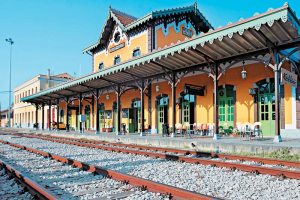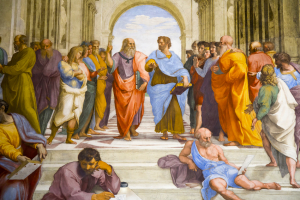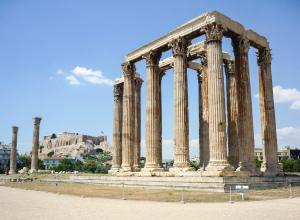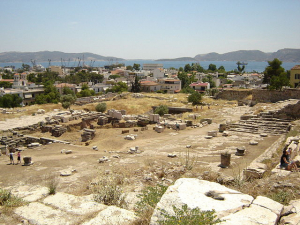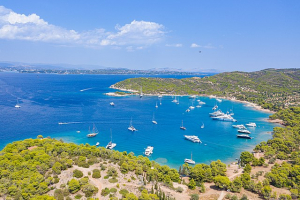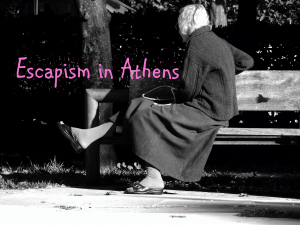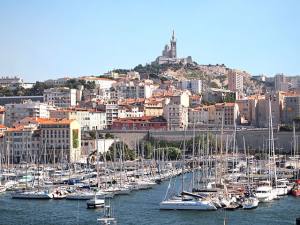ABOUT US
XpatAthens
Volos Railway Station: An Architectural Gem Standing Proudly For More Than A Century
The building was designed by Italian engineer Evaristo De Chirico, father of the great surrealist painter Giorgio De Chirico. It all started when work on the famous Thessalian Railway, which would connect the port of Volos by rail with Larissa, began in the Thessalian Plain and throughout Western Thessaly.
Construction works started immediately after the liberation of Thessaly in 1881. The building was completed and inaugurated by King George I in 1884. The operation of this railway network was the main reason for the explosive growth of Volos.
With the railway station of Volos, Evaristo De Chirico showed his exceptional talent, in addition to his other creations, just like the uniquely beautiful Pelion train that would follow a few years later.
The colors that decorated the magnificent building in 1884 still remain the same today, 140 years later, constituting a distinct monument and reference point for the capital of Magnesia.
In 1884, when the railway station of Volos was inaugurated along with the Volos-Larissa line, another important element stood at the site. It was the monumental statue of the goddess Athena, the work of the Italian sculptor G. Previsan, which still stands to this day, in the same place, blending harmoniously with the imposing building.
On the first floor of the building, the Railway Museum of Thessaly has been operating for the last 20 years. There, rich and rare relics related to the history of the railways are exhibited. On these premises, the visitor can see old photographs, telegraphs, station clocks, period uniforms, ticket offices, engine parts, railway archives, books on rail architecture, and drawings by Ernest Chirico, all important historical documents.
Originally published in Greek on: iefimerida.gr
Plato's Academy: The World’s First University
Plato is the one figure who must receive the credit for giving birth to this unique institution. He firs acquired the land on which the Academy was eventually built, and began holding informal gatherings there to discuss philosophical issues with some of his friends.
The gatherings included thinkers such as Theaetetus of Sunium, Archytas of Tarentum, Leodamas of Thasos, and Neoclides. These meetings and discussions continued for years but it was not until Eudoxus of Cnidos arrived in the mid-380’s BC that Akademeia was recognized as a formal Academy.
The Platonic Academy is considered the world’s first university
The Platonic Academy was not an educational institution as we know it in modern times, but because it had the characteristics of a school and covered a wide variety of topics such as philosophy, astronomy, mathematics, politics, physics and more, it is considered to be the first university in the entire world.
The garden which Plato decided to use for his discussions had also been used previously by many Athenian groups, both civil and religious, with the Akademeia hosting a nighttime torchlight race from altars in Athens to the altar of Prometheus in its gardens.
The road that led to the University was also lined with the gravestones of many Athenians, and funeral games took place there, along with a Dionysian procession from the city of Athens to the site and then back into the city.
The teaching methods used by Plato, including both lectures and seminars, focused on his instructions, in addition to dialogue between teachers and students.
The Academy was free
It is worth mentioning that during Plato’s leadership of the Academy, its members did not pay any fees, and following his death, the Academy continued its operation for nearly 200 years.
In the year 86 BC, Lucius Cornelius Sulla, a Roman general and statesman who held the role of consul twice and revived Rome’s dictatorship, laid siege to the city of Athens and conquered it. The Academy was destroyed and razed to the ground.
Tragically, the magnitude of the destruction was so massive that the school never reopened. Still, the legacy of The Academy has stayed alive throughout the millennia, giving us vital knowledge and insights even today about the world in which we live.
To read this article in full, please visit: greekreporter.com
Three Greek Destinations Nominated For Best In Europe Title
The competition is being held for the 14th consecutive year by the Brussels-based organization European Best Destinations (EBD), in collaboration with Europe’s leading tourist agencies, which aims to promote culture and tourism.
A total of 21 cities in Europe have been shortlisted and are competing for the title this year including London, UK; Vienna, Austria; Toledo, Spain; Essen, Germany; Warsaw, Poland; and Copenhagen, Denmark.
Athens: A contemporary metropolis with an urban personality
EBD: “Birthplace of philosophy, democracy and drama, the city of Athens is not only an open-air museum of world-class cultural heritage attractions but also a contemporary metropolis with an urban personality.”
Athens in 2022 was announced the 15th Best European Destination, with Ljubljana in Slovenia, winning the title. In 2016, the Greek capital was considered the 2nd Best European Destination after Zadar in Croatia.
EBD: “One of the world’s oldest cities with a recorded history of 3,500 years, the Greek capital is constantly undergoing urban renewals to keep up with the evolution of time. Athens lives up to all the hype!”
Rhodes: A perfect destination for lovers of heritage
EBD: “The island of Rhodes is a perfect destination for lovers of old stones, heritage, fortresses and castles. When visiting Rhodes do not miss The Ancient Acropolis of Lindos, the historic Rhodes Old Town, explore the Palace of the Grand Master or just relax in Agios Pavlos beach.”
Milos: One of the best places for a dream holiday
EBD: “Milos Island is one of the best places for a dream holiday in Greece that you classified among the best natural pools in Europe, Best beaches in Europe (Sarakiniko Beach and its famous volcanic rocks which offer sunbathers a lunar scenery). It is also classified among the Best Sculptures in Europe with the Venus of Milo now exhibited in Paris and discovered by a peasant on the island of Milos in Greece by pure chance. Finally Milos is obviously ranked among your best islands in Greece.”
The voting for the prestigious label takes place online until February 10.
2023 Eleusis European Capital Of Culture Opening Weekend
The opening events will be organized throughout the weekend with a program of exhibitions, concerts, DJ parties and side events across the town of Elefsina.
By becoming the European Capital of Culture, Elefsina is joining an ECoC family of over 70 European cities that have held the title so far.
Originally published on: tornosnews.gr
Spetses Among The Guardian’s Top Destinations For 2023
“It’s easy to see why there’s a buzz about Spetses,” the UK newspaper says, noting that in the last two years, the small Saronic island has been the location for two major Hollywood productions: “The Lost Daughter,” starring Oscar-winning actress Olivia Colman, and Netflix’s “Glass Onion: A Knives Out Mystery,” featuring Daniel Craig, famous for his 15-year stint as James Bond, 007.
The article also references the iconic Poseidonion Grand Hotel, which is featured in the opening scene of the trailer for “Glass Onion.” Overlooking the waterfront, the luxury 5-star hotel, which first opened in 1914, oozes style and sophistication. It’s easy to see why it became such a popular haunt for Athenian high society and European aristocracy throughout the 20th century.
Famous for its old-fashioned charm, neo-classical architecture and horse-drawn buggies (private vehicles are prohibited within town limits), Spetses is anticipating even more visitors in 2023, according to the article. “We’re all feeling blessed to live here,” says Yannis Manitaras, aged 74, who was born and bred on the island.
And despite its burgeoning popularity as a holiday destination, the article notes there are still relatively affordable places to stay, including several cheap B&Bs.
To read this article in full, please visit: greece-is.com
Significant Reduction In Power Bills Coming In February
In the announcement, it was noted that the final consumer price depends on the amount of the electricity consumption subsidy announced every month by the Ministry of Environment & Energy.
The subsidy is set at a level that ensures that PPC’s final price -which serves as a benchmark as PPC is the biggest supplier- will be maintained at the level of 15-16 cents per kilowatt hour.
Therefore, the reduction of the initial price by the suppliers means that, as long as the target for the final price remains the same, the amount of the subsidy that will be announced within days will be reduced accordingly next month.
The PPC tariff announced is reduced by 57-64% compared to January, and stays at below the 20 cents per kilowatt hour threshold.
Analytically the prices for February as announced by suppliers here in Greek.
To read this article in full, please visit: keeptalkinggreece.com
Escapism Ιn Athens - FokiaNou Art Space
Life is inherently stressful, especially when you live in the big city. We often experience unpleasant, boring, even miserable moments that we would rather avoid. We seek escape from them through activities that take the mind and body away from problems and everyday life. Methods of escape vary with each individual, including travel, reading, music, music, sports, dancing, gardening, as well as drugs and alcohol, aimless walking through the city, casual sex, perhaps even the pleasure of doing absolutely nothing. Exploring what leads us to relaxation, joy and daydreaming, the small doses of happiness in the city, FokiaNou Art Space, continuing its January group exhibitions with Athens as its subject, held an open call asking artists to showcase the most characteristic Athenian expressions of escapism, in any medium.
Opening: Thursday, 19 January 18.00
Duration: 19 January – 4 February 2023
Hours: Thursday – Saturday 17.00-20.00
FokiaNou Art Space, Fokianou 24, 7th Floor, Pagrati
Μetro: Evangelismos
The Greek Origins Of Marseille
The Greeks are well known for their ancient tales of glory and tragedy, as well as their civilization’s innumerable contributions to the very foundations of our modern world.
However, what is lesser-known is that throughout the centuries, they founded scores of cities across the Mediterranean which not only exist today but thrive and play a crucial role in their region’s affairs.
One of these cities is the huge port city of Marseille, the second-largest city in France and definitely among the oldest in Europe.
This was at a time when many Phocaeans left their homeland in today’s Turkey (then Greek-speaking Asia Minor) and reached the northern shores of the Western Mediter-ranean.
They found a locale which could easily accommodate a large port and in a few years’ time, a new Greek colony had been established. Its name was ”ΜΑΣΣΑΛΙΑ” (”Massalia”).
The Greek myth of Marseille
The Greek philosopher, Aristotle, informs us about the myth concerning the foundation of Massalia.
According to this tale, Protis, the son of Euxenous from Phocaea, married Gyptis, the daughter of a King of a Celt tribe named Segobriges or Segusiavi, who lived in Gaul, ancient France. This marriage was the beginning of the story of Marseille.
When the Greek man married this rich and beautiful Celtic woman, the local King gave him the right to obtain a piece of land and build his town. This small settlement was the foundation of what was to become the well-known city of Massalia.
The greater Mediterranean region, ca. 800-550 BC
However, this well-known legend may have been disproven since, according to archaeological evidence, the Phocaeans were not the first Greeks to arrive on the northern shores of the western Mediterranean Sea.
The entire coastal region comprised of the modern regions of Catalonia, Spain, and France had seen the arrival of many Ionian Greeks before that time during their expeditions to the West to find new places to live and people with whom to trade.
Nonetheless, the city of Massalia itself was indeed established by Phocaeans, as they were the first to permanently settle there.
Other neighboring Greek colonies
The “Massaliotes,” as the Greeks of Marseille were known, first established good relations with other neighboring Greek colonies in the region beginning in the early stages of their colonization.
These colonies included the cities of Agde (Agathe Tyche, meaning ”Good Fortune”) in France; Antibes; Emporiae (the modern city of Empuries in Catalonia); Rhoda (the modern Roses in Catalonia); and, of course, the well-known cities of Nice (Nikaia) and Monaco, the modern-day cosmopolitan principality.
Originally published on: greekreporter.com
Dentist-Pass For Children To Be Launched
Goal of the Health Ministry is that starting from March 2023 parents will be able to book an appointment with a dentist of their choice simply using the new Dentist Pass voucher.
Dentists who wish to participate in this new service network will be able to participate, provided they have a registered POS.
The program Dentist-Pass includes a visit to the dentist and thus for the following services:
- Control of the child’s oral hygiene
- Dental fluoridation
- Cleaning Oral hygiene information and instructions for children and parents
One of the two parents submits an application for the issuance of the financing card through gov.gr or through the KEPs on the Program’s Electronic Platform.
The card will then be stored in the digital wallet of the beneficiary parent’s mobile phone and can be used at the POS of all dental offices.
Each voucher that will be activated will be valid for six months.
The Dentist Pass voucher is reportedly set to cover 600,000 children aged 6 to 12.
Originally published on: keeptalkinggreece.com
Meteora Among World’s Must-visit Destinations for 2023 According To Le Monde
Founded in 1944, the daily afternoon newspaper is considered France’s most trusted national newspaper, according to a 2021 Reuters Institute poll, operating a website among the country’s 50 most visited and can be easily obtainable in many non-French-speaking countries.
Le Monde’s annual Top 20 list for 2023 includes Meteora in the sixth place, referring to it as “the suspended islands” due to its unique geological landscape shaped millions of years ago, when the sea covering the area gave way to dry land creating the famed UNESCO Word Heritage site.
The newspaper’s journalist Bénédicte Bocays mentions Meteora as a family of “limestone giants” that are home “to monasteries built between the 14th and 16th century”. Bocays visited the area last year during a fam trip organized by the Greek National Tourism Organization’ (GNTO) branch in France.
Furthermore, Yoanna Sultan-R’bibo, Le Monde’s editor responsible for its travel, design and gastronomy sections, says that Meteora is the “second most popular site in Greece after the Acropolis in Athens“. She adds that the area is ideal for walking tours starting from the nearby town of Kalambaka and continuing up to the “incredible” seven-century-old cave monasteries.
The newspaper’s travel feature on Meteora also offers a detailed description of the area, emphasizing on its historical and cultural heritage. Useful information for those interested in organizing a trip to the region is also included.
Originally published on: news.gtp.gr

